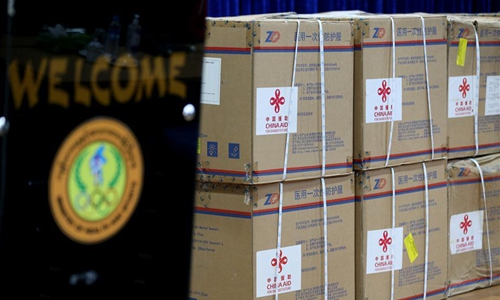China-Myanmar 'fast track' to help revive bilateral economic growth
Source:Global Times Published: 2020/6/15 19:53:40

Photo taken on May 13, 2020 shows medical supplies donated by Chinese government at the handover ceremony in Yangon, Myanmar. The Chinese government donated more medical supplies to help Myanmar in its fight against COVID-19 on Wednesday. (Xinhua/U Aung)
China and Myanmar have set up a "fast track" procedure to resume business links while maintaining a two-way, zero-infection commute amid the COVID-19 pandemic, China's Foreign Ministry said on Monday.
The "fast track" will provide convenience for necessary personnel exchanges, said Zhao Lijian, a spokesperson for the ministry.
China and Myanmar have coordinated the deployment of a number of personnel working in the fields of oil and gas, power and infrastructure projects to resume work in both directions, which is a specific practice of building a China-Myanmar community with a shared future, said Zhao.
The 'fast track' is conducive to the construction of the China-Myanmar Economic Corridor, a signature project under the China-proposed Belt and Road Initiative (BRI), as well as bilateral economic development, he added.
A source close to the matter told the Global Times on Monday that as the "fast track" is new, there have not been many Chinese companies applying to use it.
"As far as I know, China National Petroleum Corp (CNPC) and CITIC Group have applied," the person said.
"Chinese personnel who want to go to Myanmar via the 'fast track' need to first report to the Chinese Embassy and then they will be connected to the relevant departments in Myanmar, which would then issue an inbound approval," the source said.
China and Myanmar agreed to work together to build a community with a shared future, ushering in a new chapter of bilateral ties, during Chinese President Xi Jinping's state visit to the Southeast Asian nation in January.
During the visit, agreements in sectors including politics, trade and investment, people-to-people exchanges and regional cooperation were signed between Chinese and Myanmar companies, according to the Xinhua News Agency, and the two sides forged closer economic cooperation under the BRI.
In 2019, bilateral trade rose 28.5 percent year-on-year to 128.91 billion yuan ($17.71 billion), customs data showed on Monday.
Posted in: ECONOMY